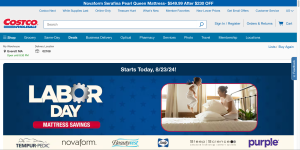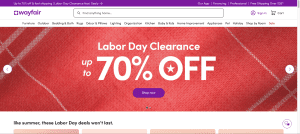
In the dynamic world of e-commerce, staying ahead of the competition is crucial. This often means having the most competitive prices on the market. To achieve this, many businesses turn to the best competitive pricing tools.
These tools utilize data science and machine learning to provide insights into competitor pricing strategies, helping businesses optimize their pricing models to improve profitability and market position.
Why Use The Best Competitive Pricing Tools?
The best competitive pricing tools are essential for several reasons:
1. Automation Saves Time: Automatically track competitors’ prices and market trends.
2. Enhanced Market Insights: Gain deep insights into competitors’ pricing strategies.
3. Optimized Pricing Strategies: Set prices that attract customers while maximizing profits.
4. Stay Ahead of the Market: Quickly adjust to market changes to maintain competitive advantage.
5. Understand Promotion and Discount Trends: Leverage data to plan profitable promotions.
The 14 Best Competitive Pricing Tools in 2024
Let’s explore the best competitive pricing tools in 2024 for maintaining competitive pricing. We are detailing their features, pros, cons, pricing, and best use cases:
1. Pricefy
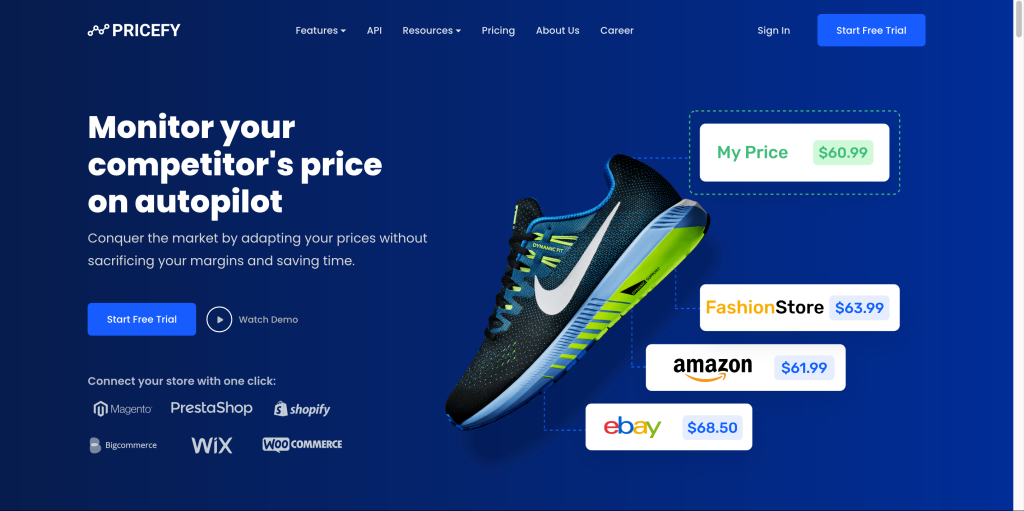
Pricefy offers robust competitive pricing tools and dynamic pricing platform tailored for e-commerce businesses. It helps users monitor competitor prices and market trends in real-time, allowing for quick pricing adjustments. The tool integrates with major e-commerce platforms, enhancing its usability and effectiveness.
Pros:
- Real-time pricing updates
- Broad e-commerce platform integration
- User-friendly interface
Cons:
- May be more suitable for larger enterprises
Pricing: Customized based on client needs
Best for: E-commerce businesses of all sizes looking for a comprehensive pricing tool that integrates well with existing systems
2. Competera
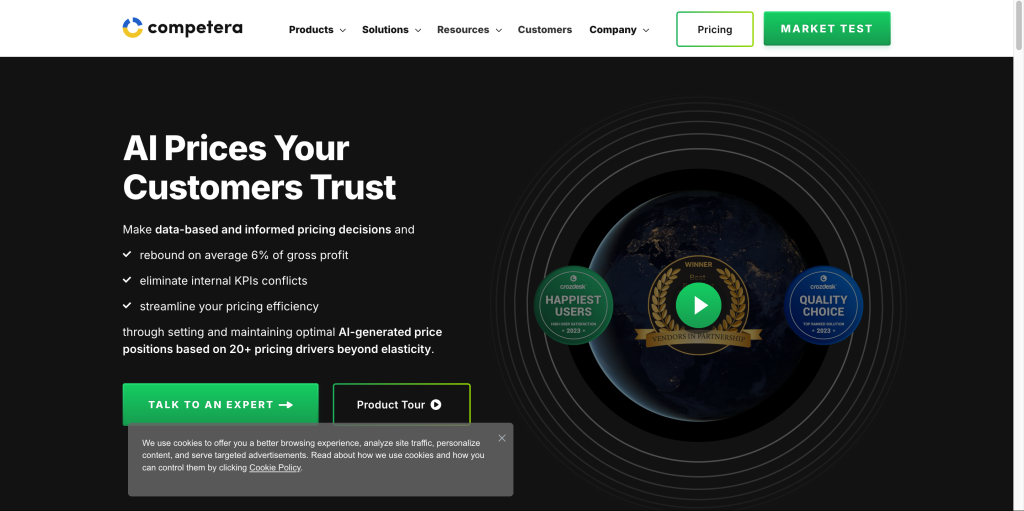
Competera is a pricing tool designed for retailers to gain pricing transparency and optimize their pricing strategies. It uses AI to provide price recommendations, ensuring competitiveness and profitability. The platform supports both price tracking and optimization across multiple geographies.
Pros:
- AI-driven price recommendations
- Supports multi-market strategies
- High accuracy in data collection
Cons:
- Can be complex to set up
- Higher cost than some competitors
Pricing: Based on the features and scale required
Best for: Multi-market retail businesses requiring sophisticated pricing intelligence and optimization
3. Skuuudle
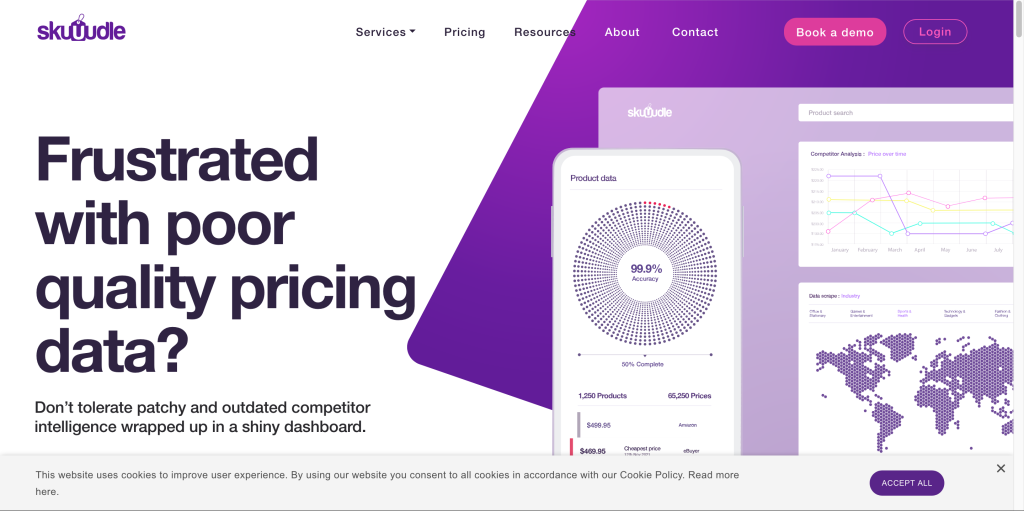
Skuuudle provides competitive pricing tools and analysis for retailers and brands. The tool offers high-quality data that helps businesses make informed pricing decisions based on competitors’ price points and market trends. Skuuudle is designed to handle large datasets efficiently, making it suitable for businesses of all sizes.
Pros:
- High-quality, accurate market data
- Scalable for all business sizes
- Integrates with multiple ecommerce platforms
Cons:
- May require some technical knowledge to fully utilize
- Custom reports can be expensive
Pricing: Variable, depending on the level of service and data requirements
Best for: E-commerce businesses and brands looking for a scalable solution to gather and analyze competitor pricing and product data across multiple markets.
4. Netrivals – (Acquired by Lengow)
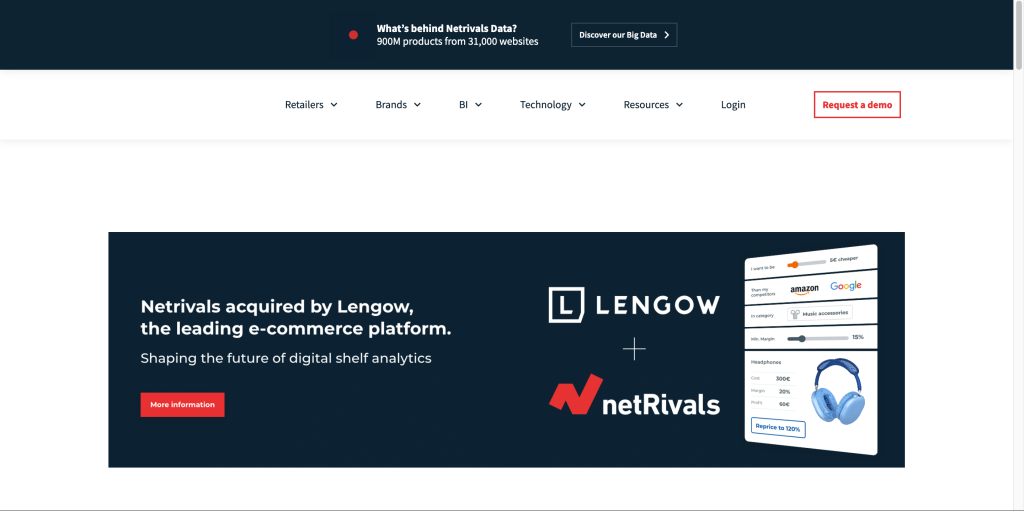
Netrivals is a software solution designed for brands and online retailers to track and analyze market data. It offers real-time insights into pricing, product assortment, and stock levels across multiple channels. This tool is known for its powerful analytics and reporting capabilities.
Pros:
- Real-time market data
- Powerful analytics tools
- Easy integration with e-commerce platforms
Cons:
- May require training to use effectively
- Pricing can be high for smaller companies
Pricing: Custom pricing depending on the services chosen
Best for: Brands and retailers needing detailed insights into market conditions and competitor activities
5. Repricer
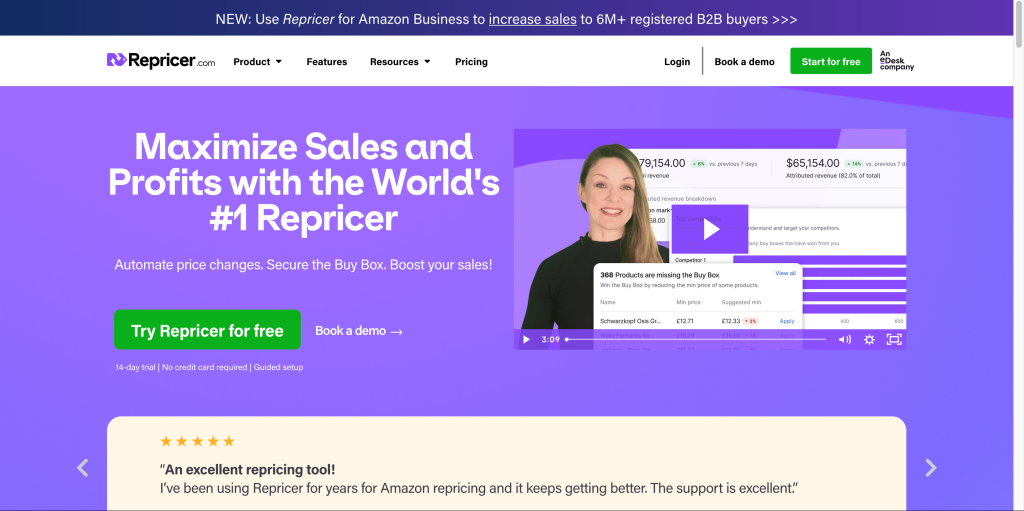
Repricer is specifically designed for sellers on Amazon and eBay, aiming to help win the Buy Box more often. It automatically adjusts prices based on competitor actions and market conditions. This tool is essential for marketplace sellers looking to stay competitive without constant manual adjustments.
Pros:
- Automated repricing
- Targeted for Amazon and eBay sellers
- Helps increase Buy Box win rate
Cons:
- Focused only on Amazon and eBay
- Limited use outside these platforms
Pricing: Starts at $75/month
Best for: Amazon and eBay sellers needing automated solutions for competitive pricing and Buy Box strategies
6. Omnia Retail
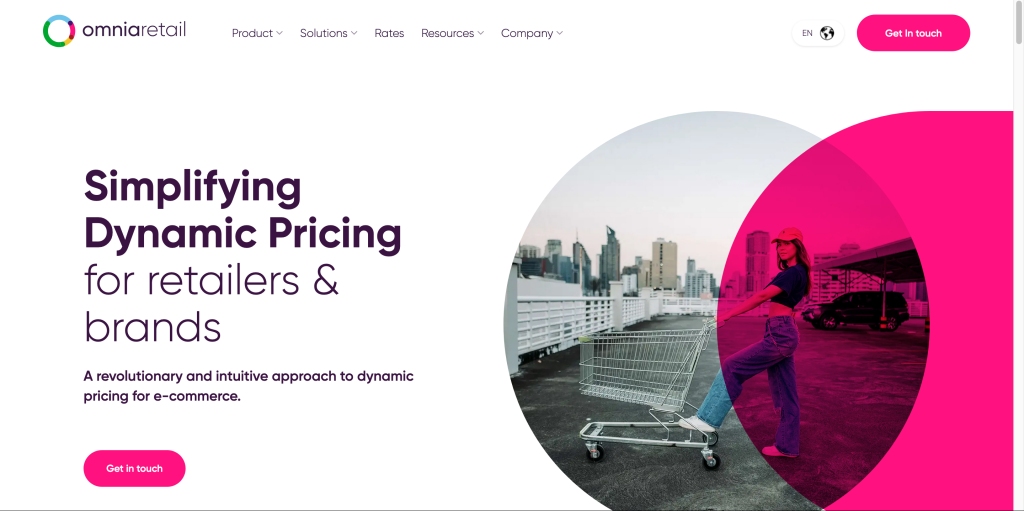
Omnia Retail offers dynamic pricing software that helps retailers automate pricing and product marketing across all channels. The tool uses data-driven insights to optimize prices and promotions, ensuring businesses remain competitive. It features a robust set of tools for both pricing and marketing automation.
Pros:
- Comprehensive pricing and marketing automation
- Data-driven decision making
- Scalable across multiple channels
Cons:
- Can be complex to fully integrate
- May be more suitable for larger retailers
Pricing: Custom pricing based on client requirements
Best for: Larger retailers looking for a complete solution to automate pricing and promotional strategies across multiple sales channels
7. Price2Spy
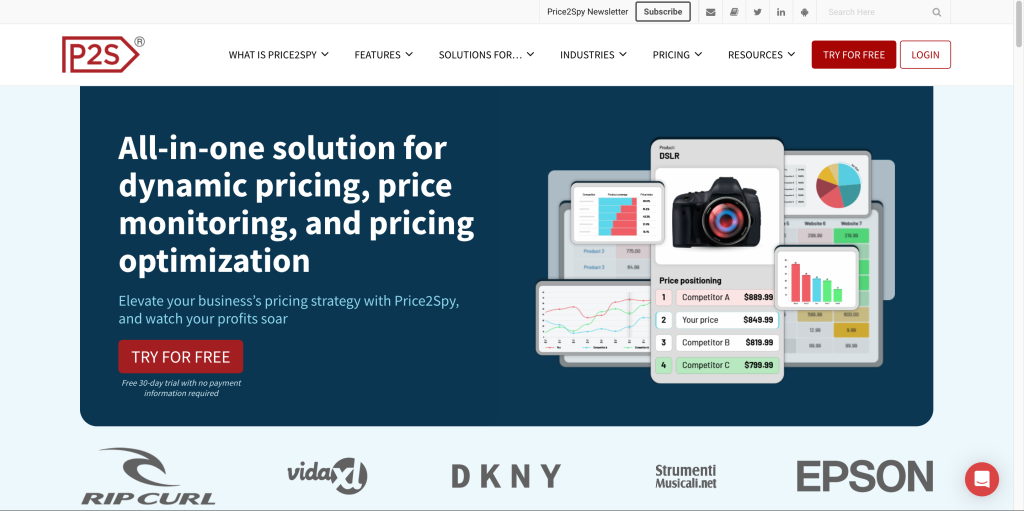
Price2Spy is an online price monitoring and comparison tool that helps businesses track competitors’ prices and detect pricing anomalies. It is straightforward to use and supports various reporting features, including email alerts and dashboard summaries.
Pros:
- Easy to set up and use
- Real-time alerts and notifications
- Supports both B2C and B2B environments
Cons:
- Basic features in the standard plan
- Integration with some platforms may be limited
Pricing: Starts at $19.95 per month
Best for: Small to medium-sized businesses looking for an affordable and effective way to monitor competitor prices
8. Minderest
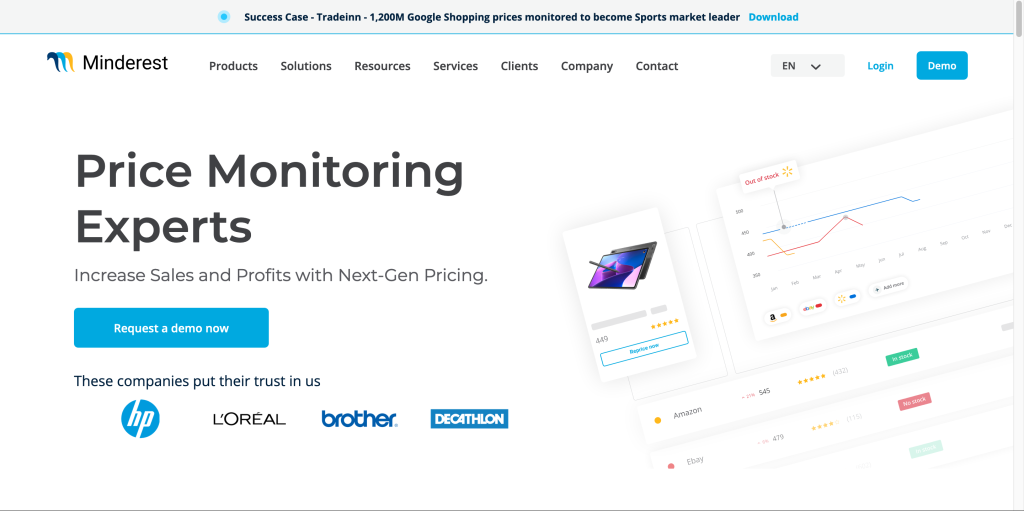
Minderest excels in providing services for price and assortment intelligence, serving retailers and manufacturers. It delivers detailed competitor analysis and assists in optimizing pricing strategies effectively. The platform is also known for its robust assortment planning features.
Pros:
- Detailed competitor pricing insights
- Assortment optimization capabilities
- Good customer support
Cons:
- Pricing may be prohibitive for smaller businesses
- Complex features require a learning curve
Pricing: Customized based on the scope of services
Best for: Retailers and manufacturers needing detailed insights into competitor pricing and product assortment for strategic planning
9. BlackCurve
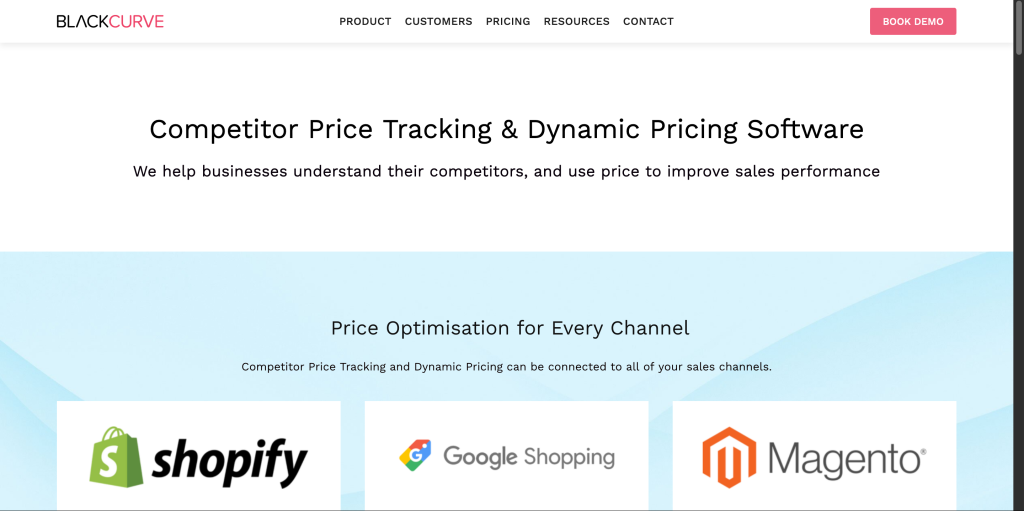
BlackCurve helps companies manage and optimize their pricing strategies using artificial intelligence. The tool is designed to maximize profits through smarter pricing decisions based on comprehensive market data analysis.
Pros:
- AI-powered pricing optimization
- Robust analytics and reporting
- Integrates with several business systems
Cons:
- May require advanced understanding of pricing strategies
- Higher price point
Pricing: Based on the size of the business and the features required
Best for: Mid to large-sized businesses seeking advanced pricing intelligence and profit maximization
10. Pricefx
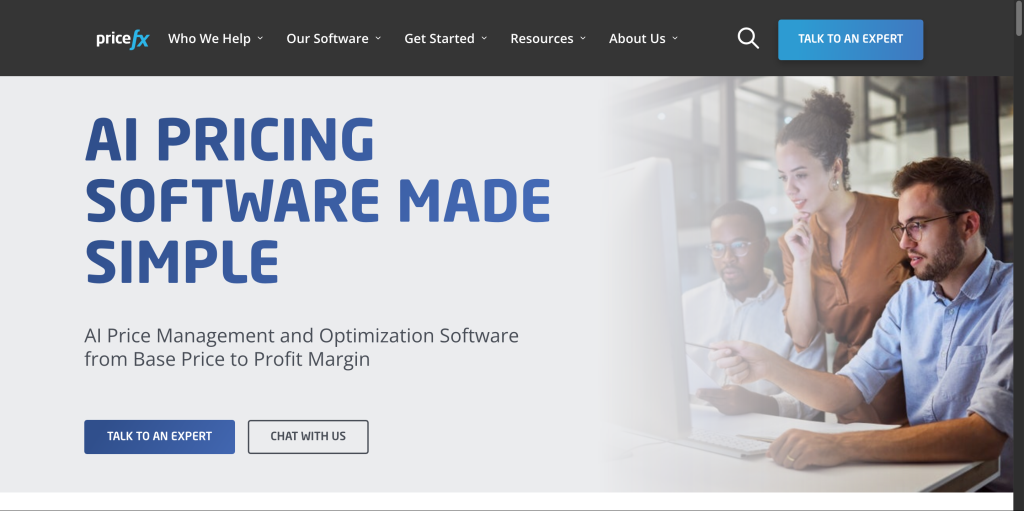
Pricefx offers a full suite of pricing capabilities including management, optimization, and CPQ (Configure, Price, Quote) solutions. It is known for its flexibility and scalability, catering to businesses of all sizes across various industries.
Pros:
- Flexible and scalable solutions
- Comprehensive pricing tools including CPQ
- Good customer support
Cons:
- Integration can be complex and time-consuming
- May require significant training
Pricing: Pricing information is not publicly listed; customized based on needs
Best for: Large enterprises looking for a comprehensive pricing solution that can be tailored to specific business needs
11. PROS
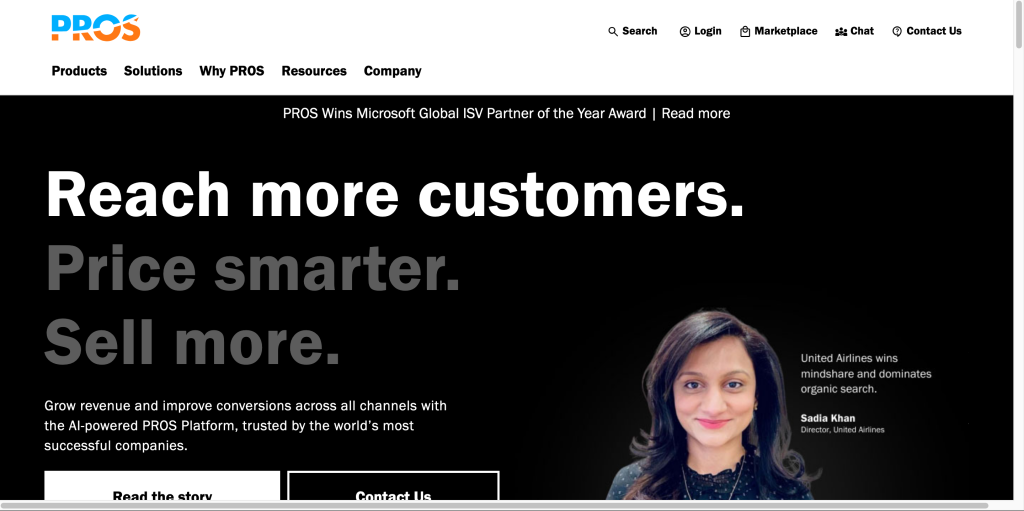
PROS offers sophisticated software solutions for price optimization, management, and realization. Its capabilities are designed to help businesses outperform in digital commerce by utilizing AI to predict customer behavior and optimize pricing.
Pros:
- Advanced AI capabilities
- Comprehensive pricing solutions
- Suitable for complex and dynamic markets
Cons:
- High cost
- May involve a steep learning curve for new users
Pricing: Custom pricing; typically high, possibly starting from several thousand dollars per month.
Best for: Large corporations in industries like manufacturing, distribution, and services looking for dynamic pricing based on AI-driven insights
12. Wiser Solutions
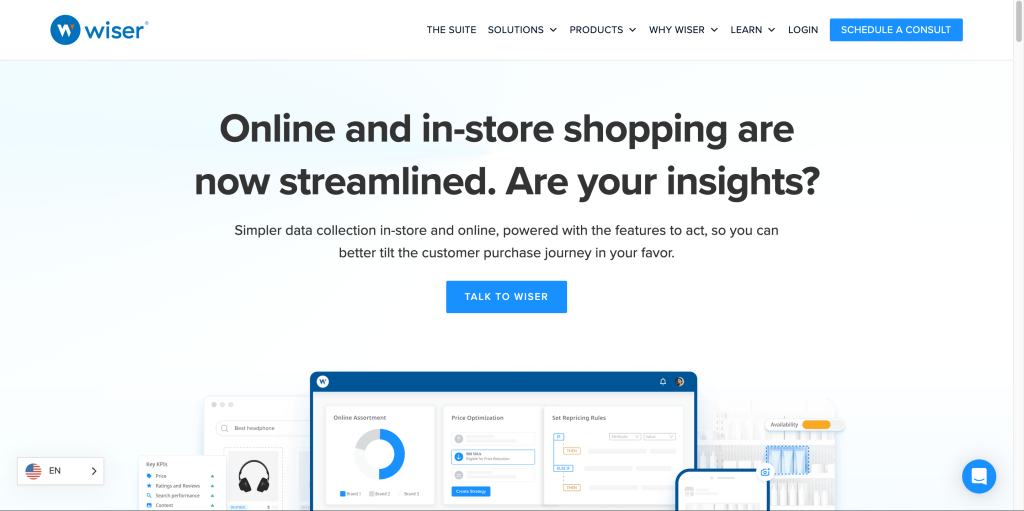
Wiser Solutions offers a dynamic pricing platform that enables retailers to make data-driven pricing decisions. This tool integrates competitive intelligence, rules-based pricing engines, and machine learning to optimize retail pricing strategies.
Pros:
- Integrates several data sources for comprehensive insights
- Machine learning enhances pricing decisions
- Flexible rule-based pricing
Cons:
- Requires data integration setup
- Pricing may vary based on the depth of features required
Pricing: Custom pricing based on business needs and scale
Best for: Retailers requiring robust analytics and adaptive pricing strategies to stay competitive
13. PriceManager
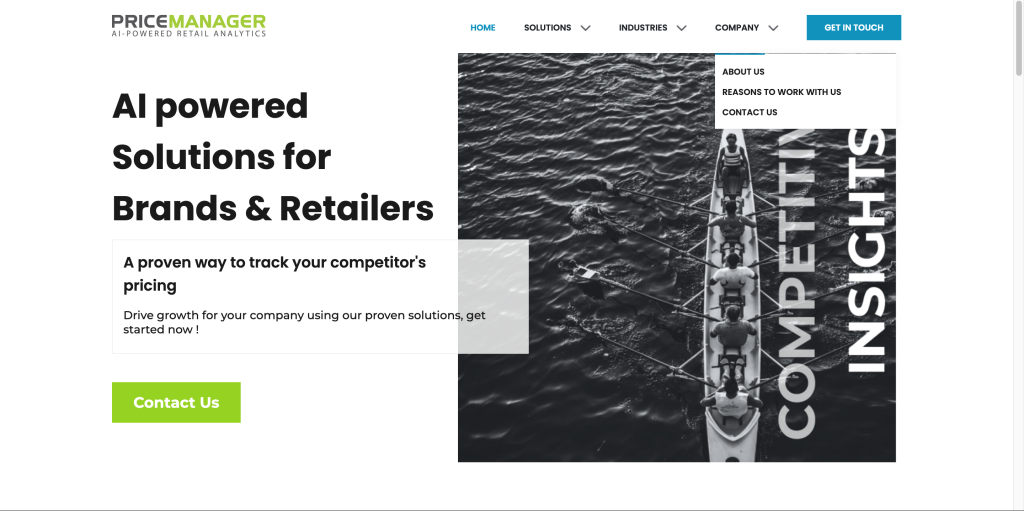
PriceManager is a subscription-based pricing intelligence solution designed to help retailers and manufacturers monitor and analyze their competitors’ prices and strategies. It offers powerful tools to enhance visibility into competitive landscapes.
Pros:
- User-friendly interface
- Comprehensive data collection and analysis
- Effective for both retail and manufacturing sectors
Cons:
- Subscription model may not suit all budget types
- Limited customization options
Pricing: Subscription-based, details upon request
Best for: Businesses needing a reliable and straightforward tool for competitive price monitoring and analysis
14. Zilliant
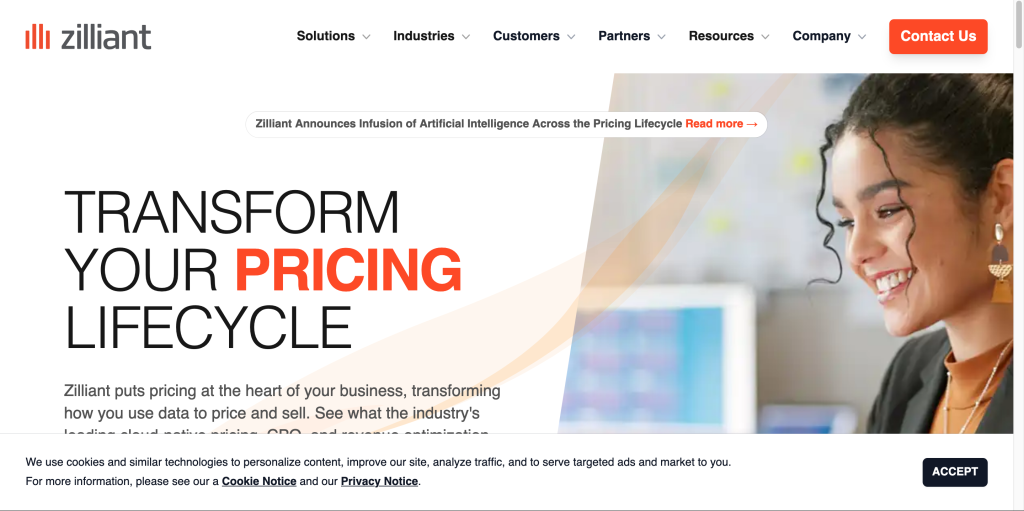
Zilliant offers a market-driven pricing strategy solution, leveraging artificial intelligence to provide price optimization, management, and sales guidance. It is designed to help B2B companies maximize their revenue potential by making smarter pricing decisions.
Pros:
- AI-driven pricing strategies
- Solutions for B2B pricing complexities
- High scalability for enterprise use
Cons:
- Primarily focused on B2B, not ideal for B2C
- Initial setup and integration can be intensive
Pricing: Pricing details are customized based on company size and requirements
Best for: B2B companies looking for strategic pricing solutions tailored to complex market dynamics
Conclusion: Stay Ahead With the Best Pricing Tools
For ecommerce businesses, maintaining a competitive edge in pricing is key to attracting and retaining customers. The best competitive pricing tools like Pricefy offer a comprehensive suite of features to track, analyze, and optimize pricing strategies effectively. By leveraging pricing tools, businesses can ensure they not only compete but lead in their markets.
Ready to lead with the best pricing tools?
Try Pricefy today and redefine your pricing strategy for ultimate market dominance!

